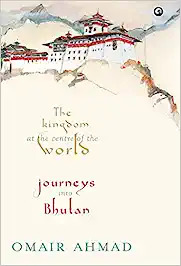
Malayalam, the lingua franca of the Indian state of Kerala and the union territories of Lakshadweep and Puduchery, is one of the six classical languages of India. Malayalam literature comprises those literary texts written in Malayalam, a South-Dravidian language spoken in the Indian state of Kerala. The first travelogue in any Indian language is the Malayalam Varthamanappusthakam, written by Paremmakkal Thoma Kathanar in 1785. Malayalam literature has been presented with 6 Jnanapith awards, the second-most for any Dravidian language and the third-highest for any Indian language.

Raja Ravi Varma was an Indian painter and artist. He is considered among the greatest painters in the history of Indian art. His works are one of the best examples of the fusion of European academic art with a purely Indian sensibility and iconography. He was known as the first modern Indian artist. Specially, he was notable for making affordable lithographs of his paintings available to the public, which greatly enhanced his reach and influence as a painter and public figure. His lithographs increased the involvement of common people with fine arts and defined artistic tastes among common people. Furthermore, his religious depictions of Hindu deities and works from Indian epic poetry and Puranas have received profound acclaim. He was part of the royal family of erstwhile Parappanad, Malappuram district.

Gross National Happiness (GNH), sometimes called Gross Domestic Happiness (GDH), is a philosophy that guides the government of Bhutan. It includes an index which is used to measure the collective happiness and well-being of a population. Gross National Happiness Index is instituted as the goal of the government of Bhutan in the Constitution of Bhutan, enacted on 18 July 2008.

Tourism in Bhutan began in 1974, when the Government of Bhutan, in an effort to raise revenue and to promote Bhutanese unique culture and traditions to the outside world, opened its isolated country to foreigners. In 1974 a total of 287 tourists visited the Kingdom of Bhutan. The number of tourists visiting Bhutan increased to 2,850 in 1992, and rose dramatically to 7,158 in 1999. By the late 1980s tourism contributed over US$2 million in annual revenue.

Namita Gokhale is an Indian writer, editor, festival director, and publisher. Her debut novel, Paro: Dreams of Passion was released in 1984, and she has since written fiction and nonfiction, and edited nonfiction collections. She conceptualized and hosted the Doordarshan show Kitaabnama: Books and Beyond and is a founder and co-director of the Jaipur Literature Festival. She won the 2021 Sahitya Akademi Award.
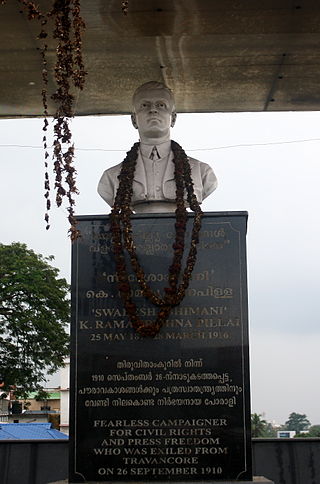
K. Ramakrishna Pillai (1878–1916) was an Indian nationalist writer, journalist, editor, and political activist. He edited Swadeshabhimani, the newspaper which became a potent weapon against the rule of the British and the erstwhile princely state of Travancore and a tool for social transformation. His criticism of the Diwan of Travancore, P. Rajagopalachari and the Maharajah led to the eventual confiscation of the newspaper. Ramakrishna Pillai was arrested and exiled from Travancore in 1910. Vrithantha Pathra Pravarthanam (1912) and Karl Marx (1912) are among his most noted works in Malayalam, Vrithantha Pathra pravarthanam being the first book on journalism in Malayalam and Karl Marx, the first ever biography of Karl Marx in any Indian language. But it has been alleged that he plagiarized the biography from an essay, Karl Marx:A Modern Rishi, by Lala Hardayal, published in 1912 March issue of the Modern Review, published from Kolkata.
Human rights in Bhutan are those outlined in Article 7 of its Constitution. The Royal Government of Bhutan has affirmed its commitment to the "enjoyment of all human rights" as integral to the achievement of 'gross national happiness' (GNH); the unique principle which Bhutan strives for, as opposed to fiscally based measures such as GDP.
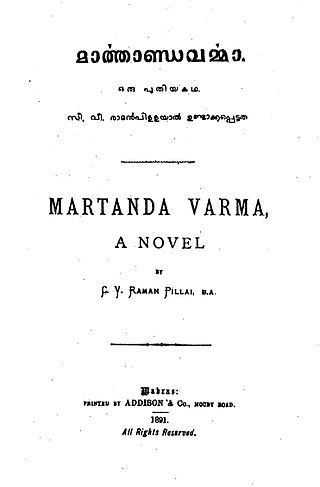
Marthandavarma is a historical romance novel by C. V. Raman Pillai published in 1891. It recounts the history of Venad (Travancore) during the final period of Rajah Rama Varma’s reign and subsequently to the accession of Marthanda Varma. Set in Kollavarsham 901–906, the story revolves around three protagonists, Ananthapadmanabhan, Subhadra and Mangoikkal Kuruppu, who try to protect the title character from Padmanabhan Thambi and Ettu Veetil Pillamar who plan to oust him from the throne of Travancore. The novel utilizes rich allusions to the Indian subcontinent and Western, historical, cultural and literary traditions.
Omair Ahmad is an Indian writer whose book Jimmy the Terrorist was shortlisted for the 2009 Man Asian Literary Prize.

Tshering Tobgay is a Bhutanese politician, environmentalist, and cultural advocate who was the Prime Minister of Bhutan from July 2013 to August 2018. Tobgay is the leader of the People's Democratic Party, and was also the Leader of the Opposition in the National Assembly from March 2008 to April 2013.

Makaramanju is a 2011 Malayalam language romantic drama film written and directed by Lenin Rajendran. The film is about celebrated painter Raja Ravi Varma's life at a certain stage in his life. It also narrates the story of epic character Pururavas. Cinematographer Santhosh Sivan and Karthika Nair appear in the lead roles, as it was also the latter' major Malayalam debut.
Ravi Varma Raja (1745–1793) was a Samantan Nair warrior prince of the Royal House of Zamorins from Calicut who fought a two-decade long revolt against the Mysore Sultanate under Hyder Ali and Tipu Sultan between 1766–1768 and 1774–1791, and later the British East India Company in 1793.
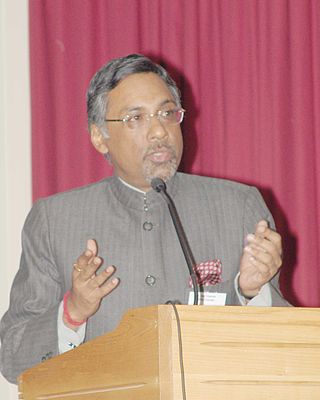
Pavan K. Varma is an Indian diplomat, politician, and author who served as an ambassador to Bhutan and Cyprus.

Leena Nair is an Indian business executive who is the Global CEO of Chanel. Nair previously served as the Chief Human Resource Officer of Unilever and member of the Unilever Leadership Executive. Nair was responsible for the human capital of Unilever, which operates across multiple regulatory and labour environments spread over 190 countries. Under her leadership, Unilever has been named the number one FMCG graduate employer of choice in 54 countries. She headed the Diversity and Inclusion agenda for the organisation ensuring that its workforce is diverse and inclusive. Nair is an advocate for human-centred workplaces and compassionate leadership.

Prabha Varma is a poet, lyricist, journalist and television presenter. He has published ten collections of poems, three novels in verse, six books on the contemporary socio-political milieu and literature, six collections of essays in criticism, a study on media, a travelogue and a novel in english.
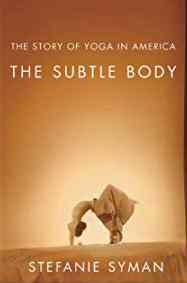
The Subtle Body: The Story of Yoga in America is a 2010 book on the history of yoga as exercise by the American journalist Stefanie Syman. It spans the period from the first precursors of American yoga, Ralph Waldo Emerson and Thoreau, the arrival of Vivekananda, the role of Hollywood with Indra Devi, the hippie generation, and the leaders of a revived but now postural yoga such as Bikram Choudhury and Pattabhi Jois.

The Himalayan Arc: Journeys East of South-east is an anthology of fiction and nonfiction edited by Namita Gokhale, with contributions by authors from the region Gokhale has described as "the bend of the Himalayas, the East of South-east, including Nepal, Bhutan, north-east India, and Myanmar."
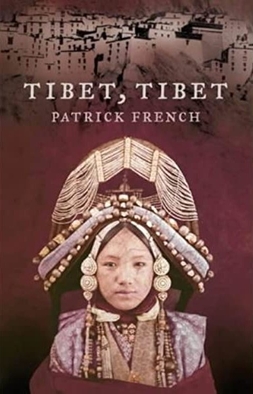
Tibet, Tibet: A Personal History of a Lost Land is a history book plus a travel memoir by Patrick French.
